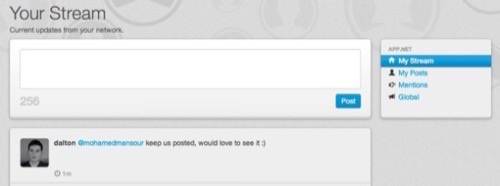
App.net has so far raised nearly $800,000 in membership fees with the promise that it will be a non-commercial, user and developer-friendly version of Twitter. It’s off to a good start, with early adopters enthusiastically kicking the tires of App.net’s alpha service and (perhaps more importantly) its API. But there is still a lot of confusion about what App.net is exactly. The key is not to view App.net as a Twitter clone, but as a service like Dropbox or Evernote.
That description of App.net as a service is based on something Dalton Caldwell told me, when I asked him why App.net isn’t open source. Caldwell, who is CEO of App.net parent company Mixed Media Labs, responded that App.net is a “services company,” just like Dropbox.
What Twitter Could Have Been (Disclaimer: We’re Not Twitter)
The confusion about what App.net is was brought on by Caldwell himself. The inspiration for App.net came from a blog post he wrote at the beginning of July. In it, he lambasted Twitter for being too focused on advertising and not focused enough on users. App.net launched with the goal of becoming “what Twitter could have been” (the title of Caldwell’s post). That’s how App.net raised $800,000 and counting.
But App.net is not a serious threat to Twitter. Twitter is too big and established as a microblogging service. Just look at the usage of Twitter by Usain Bolt and millions of others during the Olympics. The purpose of App.net isn’t to displace Twitter, it’s to become “a new infrastructure for social web applications” – as entrepreneur/developer Orian Marx described it.
The current alpha service, which does resemble a basic version of Twitter, is just one of potentially hundreds of applications that will use the App.net infrastructure. We’re already seeing third party applications built on this platform, such as a mobile-optimized site called shrtmsg and a Chrome browser extension called Succynct.

The Open Source Question
Which brings us back to the open source question. I asked Caldwell about open source because of a comment that Christian Scholz, a developer from Germany, left on ReadWriteWeb last night:
“I don’t get why I should back a project which then is not open source. What’s the point in that? What if they don’t take off and the thing dies. Not even the source might be available then? What if they choose to change their business model? As long as it’s not open source and distributed it’s the same lock in to me.”
That’s a legitimate concern for developers, especially if they are going to build a commercial application on App.net’s platform. It’s also a valid concern for users, because they’ll be paying to use the service.
Dalton Caldwell’s response was that developers and users alike should treat App.net as a service similar to Dropbox, the online file storage company. People pay from $9.99 per month to have more than the basic storage plan on Dropbox. App.net, Caldwell is saying, is a service just like that. The risks of developing on or using App.net are the same as developing on or using Dropbox – if it fails, then it’s game over. Although Caldwell is also hedging his bets – “to be clear we are *not* saying that we will not open source things, we are just trying to not over-promise at this point in time.”
Why App.net Is a Service
Dave Winer, one of the inventors of RSS, suggests that an alternative to App.net would be “a microblogging server that’s a simple install on EC2 or Rackspace or any other easy cloud-based server.” In this approach, you’re not relying on one company (Mixed Media Labs) to serve all of your needs. Winer’s alternative is a decentralized approach, which spreads the risk.
But ultimately, App.net has picked a business model that suits this era of the Web. Increasingly, your content and digital life is online. Specialist “services companies” have emerged to take care of particular online needs – Dropbox for file storage, Evernote for notes, GitHub for code hosting, iTunes Match for music sync, and so on. Yes it is more of a risk, because these are centralized services that could eventually fail. On the other hand, these companies are specialists and their reputations rely on being the best at what they do. It’s no different to buying a car from Volkswagen because you trust that brand.
So what is App.net? It’s a self-described “social feed” service – a.k.a. a microblogging service. It’s unclear at this point if this is a service many consumers will actually want. App.net is more likely to find success as an infrastructure service for third party developers who need microblogging functionality in their apps. But who knows, perhaps consumers will see the value in an ad-free premium microblogging service.
Whatever happens, App.net is a fascinating company to watch. It reminds me a lot of RSS circa 2003 and Twitter in its very early days.















